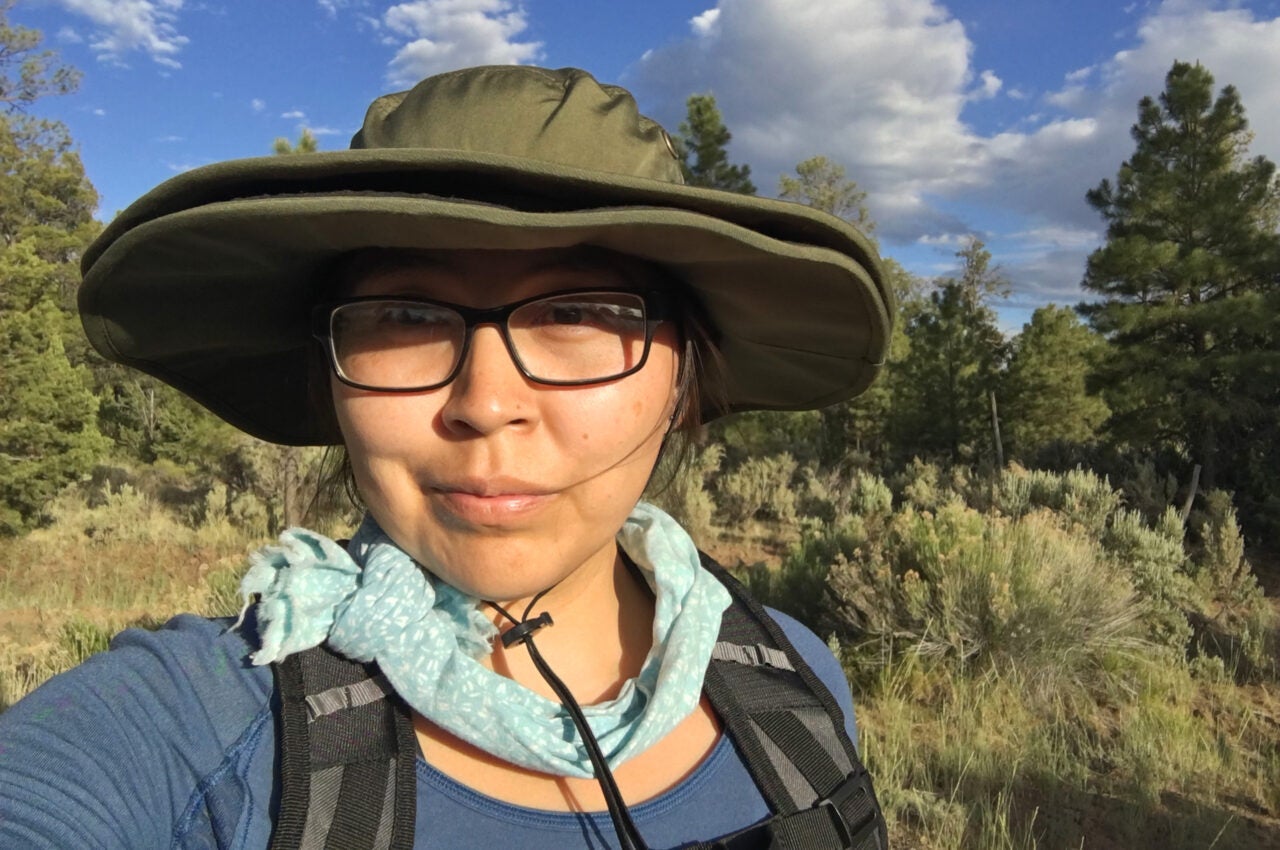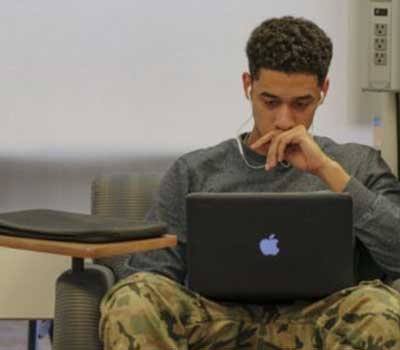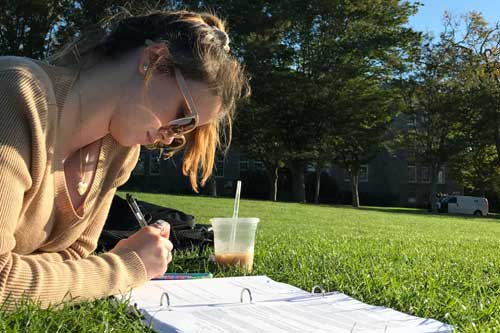
As a child, Rhiannon Sorrell M.A., M.L.I.S. ’14, would sit with her grandmothers, weavers, as they worked at their looms, creating from a place of pure inspiration.
“In the Navajo way of weaving, we don’t have preset patterns. We don’t trace patterns. It’s all in the head,” Sorrell says. “And it just comes out in the weaving process.”
Sorrell is now an assistant professor and the instruction and digital services librarian at Diné College in Tsaile, Arizona, which serves the Navajo Nation, of which she is a member. Diné College is the first tribally controlled, accredited college in the United States. She smiles at the thought that the way her grandmothers learned to weave — independent of any formal classroom instruction — is not so different from how she’s come to learn to code.
“In librarianship, there’s always talk about wearing many hats, and it’s certainly true when you work for a tribal college or institution. And so, I found myself playing around with code. And I would sit there staring at it, thinking, ‘Okay, how do I figure out where to place something so as not to mess the whole thing up?’ And I kept thinking, ‘I wish this were a loom.’ And I started to see the analogy, sitting there, putting commands into content containers, and making sure everything lined up correctly, that what I was thinking was being reflected on the page.
“In some ways, coding could be seen as easier,” Sorrell says and smiles. “You run it, see the outcome, and if you make a mistake, you can go back and undo it. With weaving, it’s not an instant undoing.”
Metaphorically speaking, weaving may also be the right characterization of Sorrell’s work as a student at URI, where she found a path to pursue her interests in creative writing, language, film, culture, and librarianship guided by the late Professor Cheryl McCarthy, who taught in the Graduate School of Library and Information Science for 25 years, and English Professor Mary Cappello, an award-winning poet, author, literary and cultural theorist, and editor.
“Being an Indigenous researcher, you’re driven by what’s personal to you”
Sorrell has a particular interest in early 20th-century films of Navajo arts and culture. Created to promote tourism by persons outside of the tribe, the films’ narration reflects the outsider’s point of view, a perspective often racist. Sorrell is working on a counter-narration digital reparations project that would restore authenticity to what viewers are seeing in these sheepherding, weaving, and jewelry-making films, Sorrell says.
Sorrell’s interest in such work began at URI in a creative nonfiction writing seminar with Professor Mary Cappello, now retired.
“The class was one of the few places where I started to see myself as not just some outside researcher looking in. I started feeling and seeing myself as integral to the work I was involved with, the work that was going on, because there’s this notion in Indigenous research methods that the researcher cannot be impartial and outside of the research, that they are not an impartial observer. And being an Indigenous researcher, you’re driven by what’s personal to you. When I first started writing creative nonfiction at the undergraduate level, people would tell me that my nonfiction writing was not about a universal experience, that it did not fit into typical genres, that I was writing from a place of magical realism, fiction.
“Mary Cappello’s class helped me reframe all of that. None of this falls into a particular genre or area of research that is clearly defined, and it’s an ongoing process because a lot of us are working with materials and working in an area of utilizing these resources, archival materials, that affects us as well. And we’ve got to be careful about how we handle them and how we approach them.”
‘Not all knowledge is meant for everyone’
Indigenous cultures contain privileged knowledge that is not meant to be shared outside the community. And sometimes, ensuring permanence presents a challenge even within a culture. In the Navajo oral tradition are stories of coyotes, often cast as tricksters in tales. At one point, these coyote trickster tales were made into cartoons voiced in the Navajo language. Navajo culture mandates that these stories are not meant to be shared or talked about in non-winter months. So how to reconcile such a charge with a permanent digital archive?
“Not all the knowledge that we have is meant for everybody. And that goes against popular movements such as open access and freedom of information,” Sorrell says. “So, we’re constantly having to negotiate all these lines about what authority says about our profession.”
Sorrell is simultaneously working on projects dedicated to the creation of an Indigenous digital database and the preservation and teaching of the Navajo language and other types of cultural content. And it may surprise some to think of librarianship or scholarship as a pressure-cooker field. In this case, though, it is. Sorrell says that many in the Navajo community are worried they’re losing their language. Some scholars say that by 2030, only ten percent of the Navajo Nation will speak Navajo. Time is not on her side. Indigenous cultures are oral cultures, and memory is fleeting. Family histories and tribal cultures were largely subsumed for generations of Indigenous people through federal programs and policies of forced assimilation. For Indigenous scholars, restoration, reparation, and revitalization work is multivalent and daunting in scope. It is no easy thing to challenge authority or rewrite history.
Scholars such as Sorrell, though, are finding creative ways to navigate tradition and technology. And such an approach may be a bridge between the competing interests of restoring a people’s cultural history and protecting proprietary cultural information. For her part, Sorrell is developing information studies-based courses that are rooted in digital humanities.
Sorrell says she is grateful for the early encouragement of her work that she received at URI.
“At URI, I was part of a program that helped bring me home,” Sorrell says. “Professor Cappello and McCarthy encouraged me to question and challenge authority. They valued my work. They helped me make connections. They prepared me for the work I’ve ended up doing back home.”
— Marybeth Reilly-McGreen


